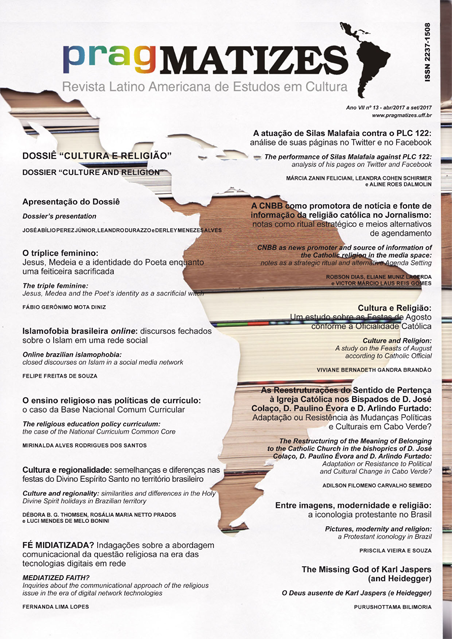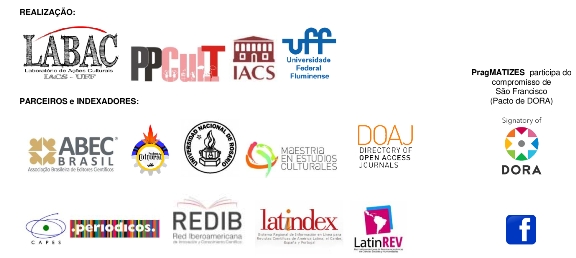The religious education policy curriculum: the case of the national curriculum commom core
DOI:
https://doi.org/10.22409/pragmatizes.v0i13.10459Abstract
This article is the result of the reflections and discussions about curricular studies and the field of Science (s) of Religion (s) in relation to Religious Education - RE, as well as its recognition as a curricular component in the National Common Curricular Base -BNCC,whose curriculum policy will be a reference in terms of contents and knowledge needed to trace learning objectives to be taught and perceived by students in public and private schools in Brazil. However, in the third version of the NCCB approved by the Ministry of Education - MEC the Religious Education was removed from this document, until this moment, this teaching was present in the last two versions of the BNCC. And, recently, Religious Education is once again recognized as a curricular component in this document. It is in this sense that the objective of this work is to analyze the discourses produced in the Curriculum Public Policies, about the exclusion / inclusion of Religious Education in the BNCC. Methodologically, this study is a bibliographic and documentary character with explanatory, reflexive and critical delineation. Methodologically, this study is of a bibliographic and documentary character with explanatory, reflexive and critical design. In view of the analyzes carried out in this study regarding Religious Education at the BNCC, we can conclude that the proposed document is more an artifact to legitimize hegemonies, prejudices, discriminations, and power relations in what concerns religious issues, given the conservative current political scenario we are experiencing.
Keywords: Religious Education; Curriculum Policy; National Curriculum Common Core
Downloads
References
BRASIL. Base Nacional Comum Curricular: Estudo comparativo entre a versão 2 e a versão final. Ministério da Educação – MEC, 2017. Disponível em: <http://cnebncc.mec.gov.br/docs/BNCC_Estudo_Comparativo.pdf> Acesso em: Maio 2017.
CURY, Carlos Roberto Jamil. Ensino religioso na escola pública: o retorno de uma polêmica recorrente. Revista Brasileira de Educação. Nº 27, 2004. Disponível em: <http://www.scielo.br/pdf/rbedu/n27/n27a12.pdf> Acesso em: Maio, 2017.
FOUCAULT, Michel.A ordem do discurso: aula inaugural no College de France, pronunciada em 2 de dezembro de 1970. 15ª.ed. São Paulo: Loyola, 2007.
_______. A Arqueologia do saber. Rio de Janeiro: Forense, 1986.
HALL, Stuart. Quem precisa de identidade?. In: SILVA, Tomaz Tadeu (Org.). Identidade e Diferença: a perspectiva dos Estudos Culturais. Petrópolis: Vozes, 2009.
MOREIRA, Antonio Flávio Barbosa; SILVA, Tomaz Tadeu. (Org.). Currículo, cultura e sociedade. 2. ed. São Paulo: Cortez, 1997.
SANTOS, Mirinalda Alves Rodrigues dos.; LACERDA, Thalisson Pinto Trindade de. (Re)significando os sentidos de currículo e interculturalidade no ensino religioso: desafios no contexto da globalização. In: VIII Congresso Nacional do Ensino Religioso-CONERE, 2016, Recife/PE. Anais do Congresso Nacional de Ensino Religioso. Florianópolis/SC: FONAPER, 2016, p. 290-304.
SILVA, Tomaz Tadeu da.O currículo como fetiche – A poética e a política do texto. Autêntica, 2007.
SÜSSEKIND, Maria Luiza. As (im)possibilidades de uma Base Comum Nacional. Revista e-Curriculum, São Paulo, v. 12, n. 03 p.1512-1529, out./dez. 2014. Disponível em: <https://revistas.pucsp.br//index.php/curriculum>.Acesso em: Maio, 2017.
Downloads
Published
How to Cite
Issue
Section
License
By forwarding an original to PragMATIZES, the authors agree that the copyright related to it is transferred to the Publishing. Articles and other writings are made available in PDF format from their publication, and they can be downloaded to institutional repositories and personal pages, provided that with their proper bibliographic indication.



